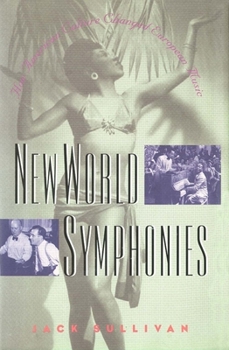New World Symphonies: How American Culture Changed European Music
Select Format
Select Condition 
Book Overview
This groundbreaking book shows for the first time the profound and transformative influence of American literature, music, and mythology on European music. Acknowledging the impact of European tradition on American composers, Jack Sullivan contends that, beginning in the nineteenth century, an even more powerful musical current flowed from the New World to the Old.
Format:Hardcover
Language:English
ISBN:0300072317
ISBN13:9780300072310
Release Date:March 1999
Publisher:Yale University Press
Length:282 Pages
Weight:1.25 lbs.
Dimensions:1.0" x 6.4" x 9.5"
Customer Reviews
1 rating
Drawing on America
Published by Thriftbooks.com User , 22 years ago
The influence of American culture on European composers has been extensive, shaping the course of music history. Author Jack Sullivan, a faculty member of Rider University in New Jersey (of which the famed Westminster Choir College is a part), has traced this connection in an illuminating book which should give Americans pause when considering their own cultural history. Though Sullivan's point of view is one of exploring how Europeans drew on American sources, what becomes increasingly clear to the astute reader is the lack of enthusiasm Americans had and continue to have for their own creative history.In a first chapter, which is alone worth the price of the book, he traces the route of African-American sorrow songs from the Black experience back to Europe through Dvorák and Delius to Debussy and to the Afro-British composer Samuel Coleridge Taylor, who was considered by most Americans to be the greatest composer alive a century ago. We learn that many of the ideas of W. E. B. DuBois grew from Dvorák's defenses of his assertion that the basis of American music should be Black Spirituals. The Czech composer's letter to the New York Herald were often quoted by DuBois (sometimes credited, sometimes not) and are here quoted by Sullivan. We also learn the impact on Delius of hearing songs from the African-American shanty towns in Florida's orange plantations as they drifted on the air to the porch of his house. Simple though it is, the photograph of the house where Delius lived in Florida carries with it a sense of the space in which he could hear songs from afar.Other chapters elucidate the effect on European composers of Poe, Whitman, the landscape, cities, and jazz and pop music. Sullivan's research is strong, his ability to connect disparate facts is engaging, and his writing is clear and lucid. Wonderful anecdotes occur throughout the book.For anyone who (like Sullivan) writes program notes or is interested in the roots of much 20th century European music, this book is a must. I found it difficult to put down and refer to it often as I write articles and reviews.Paul SomersEditorClassical New Jersey Society Journalclassicnj@home.com




